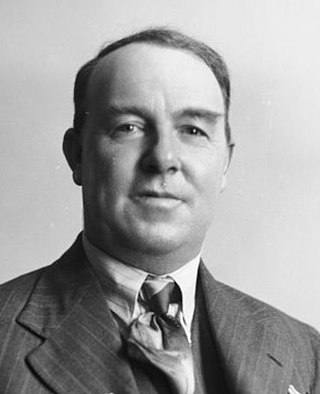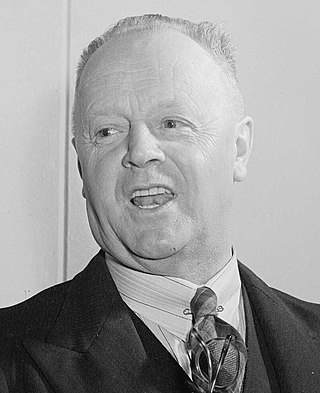
The 1957 New Zealand general election was a nationwide vote to determine the shape of the New Zealand Parliament's 32nd term. It saw the governing National Party narrowly defeated by the Labour Party. The 1957 elections marked the beginning of the second Labour government, although this administration was to last only a single term.

The 2010 Christchurch mayoral election is part of the 2010 New Zealand local elections. On 9 October 2010, elections were held for the Mayor of Christchurch plus other local government roles. Incumbent Bob Parker was re-elected.

The Christchurch mayoral by-election in 1936 was triggered by the resignation of the incumbent, Dan Sullivan, who had been appointed cabinet minister after the Labour Party winning the general election in November 1935. The election was won by John Beanland of the Citizens' Association, who narrowly beat the Labour candidate.

The 1959 Wellington City mayoral election was part of the New Zealand local elections held that same year. In 1959, elections were held for the Mayor of Wellington plus other local government positions including fifteen city councillors. The polling was conducted using the standard first-past-the-post electoral method.

The 1980 Christchurch mayoral election was part of the New Zealand local elections held that same year. In 1980, election were held for the Mayor of Christchurch plus other local government positions. The polling was conducted using the standard first-past-the-post electoral method.

The 1950 Christchurch mayoral election was part of the New Zealand local elections held that same year. In 1950, election were held for the Mayor of Christchurch plus other local government positions. The polling was conducted using the standard first-past-the-post electoral method.

The 1953 Christchurch mayoral election was part of the New Zealand local elections held that same year. In 1953, election were held for the Mayor of Christchurch plus other local government positions. The polling was conducted using the standard first-past-the-post electoral method.
The 1965 Christchurch mayoral election was part of the New Zealand local elections held that same year. In 1965, election were held for the Mayor of Christchurch plus other local government positions. The polling was conducted using the standard first-past-the-post electoral method.
The 1959 Christchurch mayoral election was part of the New Zealand local elections held that same year. In 1959, election were held for the Mayor of Christchurch plus other local government positions. The polling was conducted using the standard first-past-the-post electoral method.

The 1968 Christchurch mayoral election was part of the New Zealand local elections held that same year. In 1968, election were held for the Mayor of Christchurch plus other local government positions. The polling was conducted using the standard first-past-the-post electoral method.

The 1971 Christchurch mayoral election was part of the New Zealand local elections held that same year. In 1971, elections were held for the Mayor of Christchurch plus other local government positions. The polling was conducted using the standard first-past-the-post electoral method. The incumbent, Ron Guthrey of the Citizens' ticket, was defeated by the Labour Party candidate Neville Pickering.

The 1974 Christchurch mayoral election was part of the New Zealand local elections held that same year. In 1974, election were held for the Mayor of Christchurch plus other local government positions. The polling was conducted using the standard first-past-the-post electoral method. A significant change was the introduction of a ward system, with city councillors elected in five wards.

The 1977 Christchurch mayoral election was part of the New Zealand local elections held that same year. In 1977, election were held for the Mayor of Christchurch plus other local government positions. The polling was conducted using the standard first-past-the-post electoral method.

The 1983 Christchurch mayoral election was part of the New Zealand local elections held that same year. In 1983, election were held for the Mayor of Christchurch plus other local government positions. The polling was conducted using the standard first-past-the-post electoral method.

The 1986 Christchurch mayoral election was part of the New Zealand local elections held that same year. In 1986, election were held for the Mayor of Christchurch plus other local government positions. The polling was conducted using the standard first-past-the-post electoral method.

The 1989 Christchurch mayoral election was part of the New Zealand local elections held that same year. In 1989, election were held for the Mayor of Christchurch plus other local government positions. The polling was conducted using the standard first-past-the-post voting method.

The 1938 Christchurch City mayoral election was held on 11 May. The incumbent, John Beanland of the Citizens' Association, failed to get the nomination by his party and the surgeon Dr. John Guthrie was nominated instead. The Labour Party nominated Robert Macfarlane. Both the Labour and conservative candidate had been members of Christchurch City Council for some years. Macfarlane narrowly won the mayoralty.

The 1941 Christchurch City mayoral election was held on 17 May. The incumbent, Robert Macfarlane of the Labour Party, did not stand for re-election as he wanted to serve in WWII. Four candidates stood and Ernest Andrews of the conservative Citizens' Association was successful. Andrews was installed on 28 May 1941.

The 1944 Christchurch City mayoral election was held on 27 May. The incumbent was Ernest Andrews of the conservative Citizens' Association. Andrews was challenged by his predecessor, Robert Macfarlane, of the Labour Party, who had returned from active war service. Andrews won by a large majority.

The 1949 Lower Hutt mayoral by-election was held to elect a successor to Ernst Peterson Hay who resigned as Mayor of Lower Hutt upon his appointment as a judge of the Supreme Court. The polling was conducted using the standard first-past-the-post electoral method.












